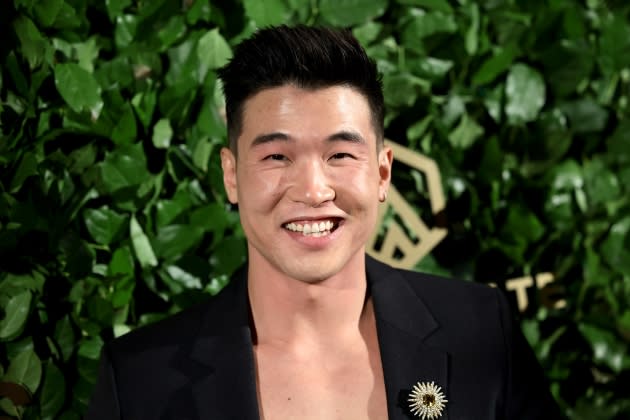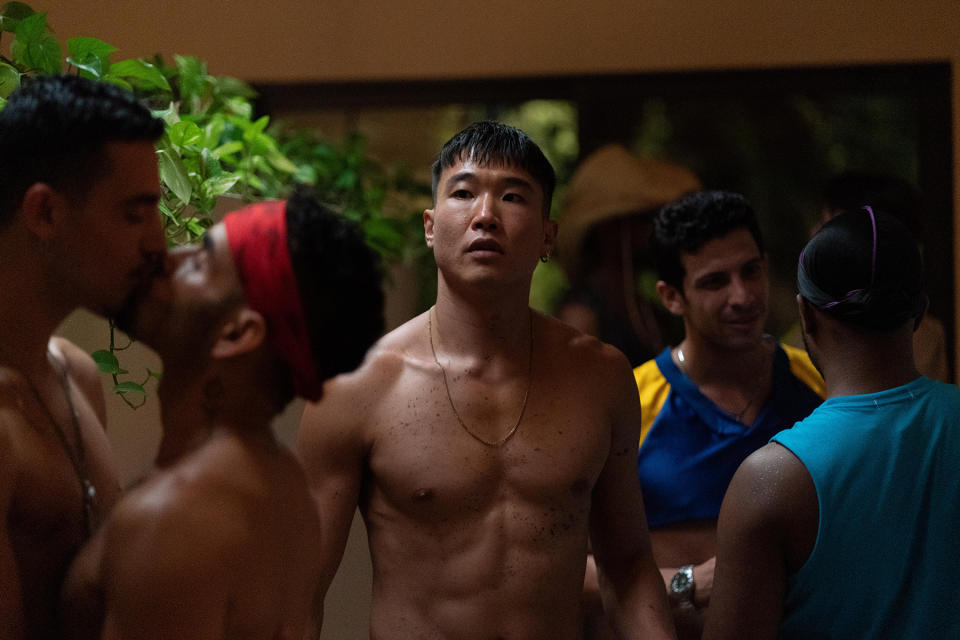Joel Kim Booster Is Striking for the Future of Queer Films
- Oops!Something went wrong.Please try again later.

Joel Kim Booster is here, queer, and ready for the Alliance of Motion Picture and Television Producers to give the Writers Guild of America a fair deal.
As a producer and writer, he’s one of the comedic voices behind some of the funniest shows on TV. He’s a credited writer on Billy on the Street, Big Mouth, and The Other Two. He’s acted in Shrill, and currently stars in the Maya Rudolph Apple TV+ comedy Loot. But it’s his feature debut Fire Island, a queer, Asian-led retelling of Jane Austen’s classic novel Pride and Prejudice that took Boster from everyday comedian to one of the most dynamic new voices in queer media. He was nominated for an Independent Spirit Award, won a GLAAD award for Outstanding Film on Streaming, and in 2023, could take home an Emmy in the Outstanding TV Movie category. Best of all, he’s on the forefront of redefining what queer stories can look like. It’s a future that Booster is desperate for. It’s also one that can’t happen while the WGA is on strike.
More from Rolling Stone
Michael Cera on Almost Marrying Aubrey Plaza and Getting Slapped by Rihanna
'Can't Cancel Pride' Announces 2023 Benefit Show Lineup With Kesha, Big Freedia, Adam Lambert
“It’s a mixed bag,” Booster tells Rolling Stone. “It’s frustrating to be in this position in the first place. Obviously, nobody wanted to be striking. But there’s a lot of solidarity on the line. There’s a lot of really positive energy and, you know, it’s still early in the strike process. So who knows? You know, mileage may vary on how long we’ll be able to keep up that energy. But for now, it feels like we’re a united front and ready to wait to get a fair deal.”
In the midst of actively picketing, Booster spent some time chatting with Rolling Stone about Fire Island, Pride month, and the way forward for more queer films.
How do all the recent developments with AI factor into your decision to join the picket line?
The scary part about it to me is the glibness with which some people are reacting to the AI portion of our requests. They’re not realizing the algorithm-written movies and television content they’re gonna get from AI. It’s going to take all of the things about our experiences and boil it down. It’s going to suck all of the actual, real human emotion out of these stories — real lived experience out of these stories. We’re really going to be in a precarious spot if we just lay down and let these studios, because of greed, replace us.

The best content often focuses on your own personal experiences — something you do exceptionally well. What’s your goal when you’re developing a project? What do you want to tell people with your art?
I just want people to feel like it is a story crafted around my own experiences. No one else’s. And that feels real. One thing that was really important to me with Fire Island was that it felt like a gay movie for gay people. I didn’t want to explain a lot of the jokes. I didn’t want to talk down to the audience. There were moments and things in the movie that certain people weren’t going to get and the studio had to be OK with that. There were a lot of battles, but I think in the end we really accomplished the goal of creating a movie that felt very specific. And in that specificity, people outside the group were able to find and see themselves as well.
Do you find the level of explanation in queer movies frustrating? Like we only get queer movies if they also help explain queerness to straight people?
That’s definitely a frustration that I had going into writing Fire Island. People really underestimate how willing people are to go on a ride into a world with you that they’re unfamiliar with. It’s really doing disservice to straight people — and you know, I am not the person to say that normally.
You’ve been open about the development Fire Island went through to become the project people saw on their screens. Did the film change what Fire Island (the place) represents for you?
It’s tough because it’s a place where I really came of age and entered into this new stage of adulthood. I really found myself and accepted my identity and queerness in a new way. But it is difficult because it’s such an impenetrable place for a lot of people. And it’s not just the issues that I speak about in the movie — the race politics and the body politics. But it’s also just economically unviable for a lot of people. So it does sort of dampen some of the magic for me, knowing that I’ve created a movie celebrating this place that a lot of people can’t even visit.
But I still think that there’s real value in a space like Fire Island that is completely queer, gay, and beautiful and historic. You can feel the history there. And I know there are efforts being made by people on the islands to make it more accessible. I just hope more people are able to experience the magic of the island in the way that I tried to capture it.
What’s the next step in your career? Did the process (and success) of making Fire Island make you feel like you’ll be more free when making another film?
I actually feel less empowered and more nervous about the second movie. I mean, it’s sophomore album syndrome in the back of my mind. It’s funny, I went through so many emotions every time I saw a screening of Fire Island. I kept thinking to myself, “I’ll never make something this good or this impactful ever again.” And by the end I was like, “I cannot watch one more second of this movie ever again.” It definitely has become sort of a little nagging fear in the back of my head. Like, is this going to be what people see me for forever? And I’d be very proud if Fire Island is my peak, quite honestly. But I wanna make sure people know that I’m not just the guy who makes gay vacation Jane Austen adaptations.
What metrics are you considering when you think about the kind of success you want your career to have?
For me, it’s a little bit about legacy — what people will remember me for. I don’t want one project to define me for the rest of my career. A lot of the stuff I’m working on now has a little bit more of a darker, dramatic sense to it, which is really exciting for me. For the longest time when I was in school, learning how to write, I wanted to be a staff writer on The Wire. Never in a million years did I think I would be writing comedy, doing stand-up, any of it. So doing some of that darker stuff feels like sort of a return to the before times.
How has this time of stopped work and just focusing on the strike this month made you think about Pride?
It’s really easy to be cynical for people of my generation, who kind of grew up seeing it sort of in real time become corporatized and about selling products and, you know, just another extension of capitalism. But I think Pride — and visibility — is really, deeply important for a lot of people right now, because they want us to be quiet. I mean, you’re seeing it in Florida right now. They want us to shut up and be quiet and fade into the background. And as long as that’s happening, Pride will be important.
Best of Rolling Stone

